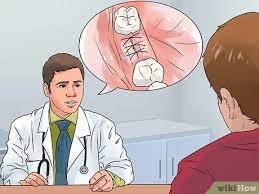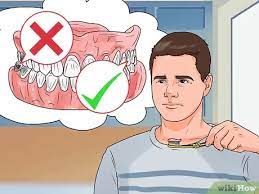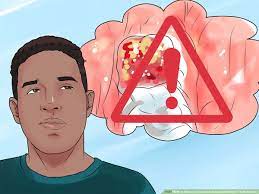If you have recently undergone a wisdom tooth extraction or have an impacted wisdom tooth, you may experience discomfort and have difficulty cleaning the area properly. One common issue is food getting stuck in the wisdom tooth hole or socket, which can be bothersome and may lead to complications if not addressed. In this article, we will discuss how to remove food particles from a wisdom tooth hole and provide tips for preventing this issue.
What Happens if Food Gets Trapped in a Wisdom Tooth Extraction Site?
When food gets trapped in a wisdom tooth extraction site, it can cause several problems. The space left behind after wisdom tooth removal or when a wisdom tooth is impacted creates a socket that is vulnerable to food accumulation. The trapped food particles can lead to bacterial growth, bad breath, and even infections. If left untreated, these infections can cause further complications and delay the healing process.
How Long Does it Take for Food to Dislodge from a Wisdom Tooth Socket?
The length of time it takes for food to dislodge from a wisdom tooth socket can vary depending on the individual and the specific circumstances of the extraction. In general, it is important to remove the food particles as soon as possible to prevent complications. If you experience persistent food impaction or discomfort, it is advisable to seek professional dental care.

Can Food Debris Cause an Infection in a Wisdom Tooth Hole?
Yes, food debris trapped in a wisdom tooth hole can potentially lead to an infection. When food particles remain lodged in the socket, they create an environment where bacteria can thrive. Bacterial growth can result in an infection known as a dental abscess, characterized by swelling, pain, and possible pus formation. It is crucial to address the issue promptly to prevent further complications.
What Are the Signs of an Infection from Food Trapped in a Wisdom Tooth Hole?
If you have an infection from food trapped in a wisdom tooth hole, you may experience the following signs and symptoms:
- Swelling and redness around the extraction site.
- Pain or discomfort that persists or worsens.
- Foul taste or odor coming from the extraction site.
- Pus or discharge from the socket.
- Swollen lymph nodes in the neck or jaw area.
- Fever and general malaise.
If you notice any of these symptoms, it is essential to seek professional dental care for diagnosis and appropriate treatment.
Is it Normal to Have Food Stuck in a Wisdom Tooth Socket after Extraction?
It is not uncommon to have food stuck in a wisdom tooth socket after extraction, especially during the initial stages of healing. However, it is important to note that this should not be a persistent issue. As the healing progresses, the socket should close up, making it less likely for food to get trapped. If you continue to experience food impaction in the socket or have concerns, consult your dentist for guidance.
Are There Any Home Remedies to Dislodge Food from a Wisdom Tooth Hole?
While it is essential to seek professional dental advice for persistent or concerning issues, there are a few home remedies that may help dislodge food from a wisdom tooth hole:
- Saltwater Rinse: Rinse your mouth gently with a warm saltwater solution to help dislodge food particles and reduce inflammation.
- Irrigation Syringe: Use an irrigation syringe, specifically designed for oral use, to flush the socket with a gentle stream of water. This can help dislodge trapped food particles.
- Oral Irrigator: An oral irrigator, also known as a water flosser, can be useful for removing food debris from the wisdom tooth hole. Follow the manufacturer’s instructions for proper usage.
- Dental Flossing: Gently floss around the adjacent teeth, taking care not to disturb the healing socket. This may help remove food particles that are trapped in the area.
It is important to remember that these home remedies should be used with caution and should not replace professional dental care. If you are unsure or have concerns, consult your dentist for guidance.
Should I See a Dentist if I Can’t Remove the Food Stuck in My Wisdom Tooth Hole?
If you are unable to remove the food stuck in your wisdom tooth hole using home remedies or if you experience persistent discomfort, it is advisable to see a dentist. A dental professional can thoroughly examine the area, remove any lodged food particles, and provide appropriate treatment if necessary.
How Can I Prevent Food from Getting Stuck in My Wisdom Tooth Socket?
Preventing food from getting stuck in a wisdom tooth socket can help promote healing and prevent complications. Here are some tips to minimize the risk:
- Maintain Good Oral Hygiene: Brush your teeth gently twice a day and floss regularly to remove food particles and maintain oral health.
- Rinse with Saltwater: Rinse your mouth with a warm saltwater solution after meals to flush out any debris and reduce the chance of food getting trapped.
- Avoid Sticky or Hard Foods: Stay away from foods that are likely to leave residue or get lodged in the socket, such as sticky candies or hard nuts.
- Practice Gentle Eating: Be mindful when eating and chew slowly to minimize the chances of food particles becoming lodged in the socket.
- Follow Postoperative Care Instructions: Adhere to the instructions provided by your dentist regarding oral hygiene, diet, and any prescribed medications during the recovery period.
By following these preventive measures and maintaining good oral hygiene, you can reduce the risk of food impaction and promote optimal healing.

Can Using an Oral Irrigator Help Remove Food Particles from a Wisdom Tooth Hole?
Yes, an oral irrigator, such as a water flosser, can be an effective tool to help remove food particles from a wisdom tooth hole. The gentle stream of water can dislodge debris and flush it away from the socket. However, it is important to use the oral irrigator properly and with caution to avoid causing any damage to the healing socket or surrounding tissues. Consult your dentist for guidance on the appropriate use of an oral irrigator in your specific case.
In conclusion,
it is essential to take measures to remove food stuck in a wisdom tooth hole to prevent complications and promote healing. If you are unable to remove the food debris or experience persistent discomfort, it is advisable to seek professional dental care. Remember to follow your dentist’s postoperative care instructions and maintain good oral hygiene to minimize the risk of food impaction and promote optimal recovery.





